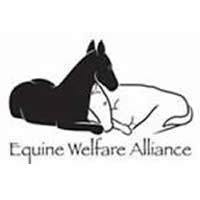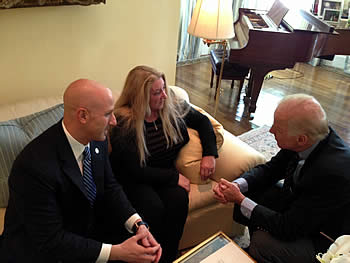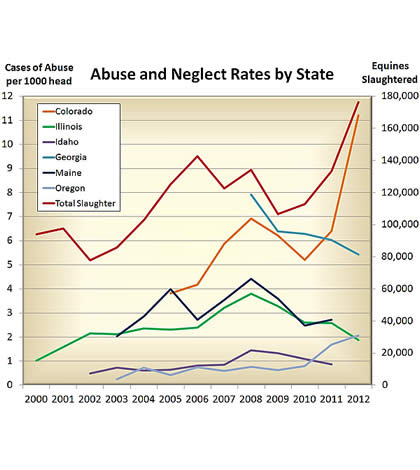Hi, my name is John Holland, and I am a data-holic. I usually spend my day furtively downloading statistics and information, analyzing it, graphing it, correlating it and trying to glean insights into the true workings of the horse world.
But today is different. Today, I was inspired to opine by a thing of great rarity in our struggle; a well-researched article. It appeared in the Saint Louis Post Dispatch titled Horse slaughterhouse plans stalled in Missouri and it convinced me we are winning this struggle, at least for the moment.
No, the article did not contain a new revelation about the outcome of a court case, or the result of a vote. It contained something even more telling: It documented Sue Wallis slipping beyond the gravitational pull of reality and into an alternate universe of anti-logic, where up is down and dark is light.
Sue begins the interview with her now familiar claim that she chose Missouri because, “If you draw a 500-mile circle from western Missouri you encapsulate 30 percent of the horse herd in the U.S.” After musing over the concept of the US horse population constituting a single “herd”, I began wondered where she got this statistic.
You see, Sue and I share different forms of compulsion. I am a compulsive fact checker while Sue is a compulsive fact creator. So I ran the numbers and the result I got was 23.6% of the US horse population being within 500 miles (as the crow flies) of western Missouri.
This means Sue’s exaggeration coefficient for this statement is 27% (i). This modest exaggeration would prove to be her perigee with reality before she would slingshot past it and off into the abyss of deep space.
After describing the law suit that had resulted in the Cole County judge’s directive to the Department of Natural Resources to hold off on issuing Rains the discharge permit, the story returned to the interview with Sue.
“The horse industry has been decimated,” Wallis said. “We have worthless horses being turned out and abandoned.”
As I read this, I again felt compelled to calibrate Wallis’ definition of decimation. The original term came from quaint custom of the Roman army by which they would execute every tenth soldier of a disgraced unit so as to improve morale. Was every tenth horse in America being abandoned?
The only state I could find that keeps abandonment data is New Mexico. During my research, they provided me with a very detailed list of all the estray horses they had picked up since 2006. Last year they picked up exactly 124 horses. Given the estimated 147,181 horses in New Mexico, this means that the abandonment rate is 0.06% or one horse in every 1,186. Since decimation would be one in ten (10%), Sue’s exaggeration coefficient had suddenly rocketed from 27% to 16,666%.
Parroting the discredited 2011 GAO report, Wallis went on to say “People take care of animals that have value. It’s when they don’t that they neglect them.”
This was the conjecture used to excuse why the GAO studied horse prices instead of actually studying neglect as it had been assigned to do. It is, of course, utter nonsense. Few household pets have any monetary value, yet most people take good care of them.
It gets better. “Every breed registry is down 70 percent since 2007. Fewer colts are being born,” Wallis said.
Apparently Wallis has data I have not seen, data showing among other things that only the birth rate of colts is in decline. Is there some strange gender asymmetry going on here? Or is it possible that the Executive Director of the International Equine Business Association, the expert of CNN interviews and countless articles does not know that colts are males and the proper term would have been foals?
As for “every breed registry being off 70% since 2007”, Sue’s exaggeration coefficient is pretty substantial. According to the Jockey Club, thoroughbred foal registrations are off 34.5%, not 70%. Some breeds appear to have been almost unaffected, but the AQHA’s annual report does show about a 49% reduction in foal registrations from its peak in 2007.
The pattern with Quarter Horses is a familiar one for those of us who have been around the horse world for a few decades. Breeds come into favor, resulting in indiscriminant breeding spurred on by the greed of their breed registry. Then the bubble bursts. Just before the decline began, the then executive vice president of the AQHA, Bill Brewer, gave an impassioned speech at their annual convention urging more breeding so there would be “enough good horses in the future”.
A great breed has been degraded in the process. Quarter Horses now commonly suffer from a wide range of maladies such as GBED, HERDA, HYPP, and Navicular. The most common complaint of owners is that they “bred the feet off them.” This could explain why AQHA membership is down 18.6% since 2007. I wondered to myself, would Sue suggest killing off a bunch of their remaining members as a solution to the decline?
Sue continues, “That’s 70 percent less feed being sold, 70 percent fewer jobs, 70 percent fewer veterinarians.”
Apparently Sue believes that a short term drop in foal (excuse me – colt) births means that the whole horse population suddenly drops by the same percentage. Despite Sue’s best efforts, horses do often live well into their 20s and beyond, meaning that recent foal crops would represent only a few percent of the population.
With a nearly 50% decrease in foals, the population of registered quarter horses dropped from 3,218,113 in 2007 to 2,978,776 in 2012 according to the AQHA annual reports, a decline of just 7.4%. Here Sue gets an exaggeration coefficient of 945%.
But at this point her thinking turns to what I will call anti-logic, because if it came into contact with rational thought the two would annihilate each other with a thunderous clap, probably decapitating their host. She is proclaiming that all of this devastation is because we have too few horses as a direct result of not killing enough of them! This would be laughable if 2012 had not seen more US horses slaughtered than any year since 1994!
One survival strategy of prey animals is to synchronize their birthing so as to overwhelm their predators. Sue has adopted this strategy with her spontaneously created facts. She spews so many at one time that at least a few have a good chance to get past us unchallenged.
At this point in the interview, Sue seems to sense her interviewer is not buying her nonsense. So she throws her hyperbole engine into warp drive, saying, “This has wrecked communities — all because of the elitist snooty arrogance of this bunch of people telling us what’s culturally acceptable to eat.”
The community of Boggy Bottom, the neighborhood behind the Dallas Crown slaughter house, was truly devastated by the pollution, stench and crime caused by the plant. I witnessed it firsthand. But where is Sue’s example of a community devastated by a lack of slaughter? Apparently with anti-logic you automatically get an anti-logic twin to Boggy Bottom, at least in the brain of Sue Wallis.
It is impossible for me to calculate the exaggeration factor for this statement because, since there is no truth at all to be exaggerated, it would require dividing by zero. I think I now fully understand Einstein’s quote about only the universe and human stupidity being infinite.
Yet the second half of the outburst is the most interesting of all.
Sue had apparently learned that the influential Busch brothers (former owners of Budweiser and Anheuser-Busch) had thrown their considerable weight into the battle on the side of the horses. Victoria McCullough had sent them a link to our report How the GAO deceived Congress, and Victoria said she thinks the outrage at this government deceit had caused them to weigh in.
Lately there has been an avalanche of high profile support for ending horse slaughter completely. In the government sector, President Obama, Vice President Biden, and Secretary Vilsack have all come out against horse slaughter. At the state level, New Mexico’s Governor Susana Martinez, former governor Bill Richardson, Attorney General Gary King and others have spoken up for the horses. Celebrities such as the incredibly influential Robert Redford and Steven Spielberg have also taken a stand.
But most aggravating of all for Sue are the “snooty, arrogant billionaires”. This is because Sue knows that the money from big agriculture was the only advantage she had in this battle. Internationally known equestrian Victoria McCullough and her “snooty arrogant” friends are serving to balance the scales by using their resources to multiply the impact of the tireless grass roots work of thousands of horse lovers and animal welfare organizations. This combination may well bring Slaughterhouse Sue crashing back to reality.
(i) How does a 6.4% error become an exaggeration factor of 27%?
Use this formula ((30-23.6)*100)/23.6), or ask your friendly local nerd.
Contact:
John Holland
540-268-5693
john@equinewelfarealliance.org









